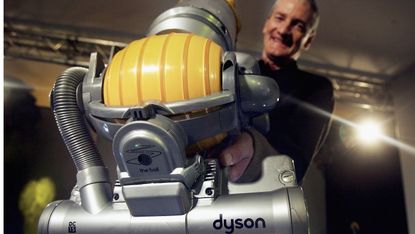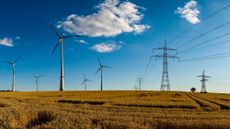EU hoover ban: Powerful vacuums outlawed
EU ban on high-power vacuum cleaners comes into force, hitting five of the seven best-rated products

Sir James Dyson, the creative force behind Dyson vacuum cleaners, is seeking a judicial review of a new EU law that has banned the sale of some of the most powerful vacuums on the market, which are officially outlawed from today.
The new EU energy label prohibits manufacturers from making and importing vacuum cleaners with a motor that exceeds 1,600 watts.
What's the law for?
Subscribe to The Week
Escape your echo chamber. Get the facts behind the news, plus analysis from multiple perspectives.

Sign up for The Week's Free Newsletters
From our morning news briefing to a weekly Good News Newsletter, get the best of The Week delivered directly to your inbox.
From our morning news briefing to a weekly Good News Newsletter, get the best of The Week delivered directly to your inbox.
"The new European rules are part of the EU's energy efficiency directive, designed to help tackle climate change," explains the BBC. And in three years time the maximum wattage will be lowered further to 900 watts.
How much energy does an average vacuum cleaner use?
On average, most cleaners on the market today operate at 1,800 watts, The Guardian says. Models at the top end, draw over 2,000 watts, such as the popular Miele s8330 model which operates at 2,200 watts.
So will UK consumers no longer be able to buy the best?
According to Which? consumer group, many of the best-rated vacuums on the market exceed 1,600 watts, "so if you're in the market for a powerful vacuum, you should act quickly, before all of the models currently available sell out". Of seven "best buy" ratings awarded by Which? vacuum cleaner reviewers, five have a motor of more than 1,600 watts.
What about Dyson cleaners?
Dyson says that its vacuum cleaners perform well in the new EU rating system, and that it has never made a product over 1,600 watts. But the company mounted its challenge because it has "many concerns about flaws in the system that will ultimately be unhelpful for consumers," the Guardian says. Some Dyson machines, such as the 1,300-watt Cinetic DC54 model, will fall foul of the tighter rules planned for 2017. A judgement from the European court of justice is due in December 2015.
How much more do top-end cleaners cost to run?
In the latest issue of its magazine, Which? noted that there is only a small difference in energy use between top models and those that would be allowed by the EU. "A Best Buy 2,200w vac costs around £27 a year to run in electricity – only around £8 more than the best-scoring 1,600w we’ve tested," says Which? Consumer groups note that the new legislation could end up being self-defeating, as lower wattage vacuum cleaners need to be used for longer to achieve the same results.
What about other household products?
The EU is consulting on changes to energy limits for other electrical goods, including hairdryers, kettles and lawnmowers, and will make a decision early next year about whether to ban high-powered models.
Create an account with the same email registered to your subscription to unlock access.
Sign up for Today's Best Articles in your inbox
A free daily email with the biggest news stories of the day – and the best features from TheWeek.com
-
 'The hard reality of an aging society'
'The hard reality of an aging society'Instant Opinion Opinion, comment and editorials of the day
By Harold Maass, The Week US Published
-
 A brief timeline of Russia's war in Ukraine
A brief timeline of Russia's war in UkraineIn Depth How the Kremlin's plan for a quick conquest turned into a quagmire
By Peter Weber, The Week US Published
-
 US energy regulator OKs rule to boost power grid
US energy regulator OKs rule to boost power gridSpeed Read The grid overhaul aims to meet a surging electricity demand
By Peter Weber, The Week US Published
-
 Will Aukus pact survive a second Trump presidency?
Will Aukus pact survive a second Trump presidency?Today's Big Question US, UK and Australia seek to expand 'game-changer' defence partnership ahead of Republican's possible return to White House
By Sorcha Bradley, The Week UK Published
-
 It's the economy, Sunak: has 'Rishession' halted Tory fightback?
It's the economy, Sunak: has 'Rishession' halted Tory fightback?Today's Big Question PM's pledge to deliver economic growth is 'in tatters' as stagnation and falling living standards threaten Tory election wipeout
By Harriet Marsden, The Week UK Published
-
 Why your local council may be going bust
Why your local council may be going bustThe Explainer Across England, local councils are suffering from grave financial problems
By The Week UK Published
-
 Rishi Sunak and the right-wing press: heading for divorce?
Rishi Sunak and the right-wing press: heading for divorce?Talking Point The Telegraph launches 'assault' on PM just as many Tory MPs are contemplating losing their seats
By Keumars Afifi-Sabet, The Week UK Published
-
 How would a second Trump presidency affect Britain?
How would a second Trump presidency affect Britain?Today's Big Question Re-election of Republican frontrunner could threaten UK security, warns former head of secret service
By Harriet Marsden, The Week UK Published
-
 'Rwanda plan is less a deterrent and more a bluff'
'Rwanda plan is less a deterrent and more a bluff'Instant Opinion Opinion, comment and editorials of the day
By The Week UK Published
-
 How the biggest election year in history might play out
How the biggest election year in history might play outThe Explainer Votes in world's biggest democracies, as well as its most 'despotic' and 'stressed' countries, face threats of violence and suppression
By Harriet Marsden, The Week UK Published
-
 'Good democracies include their poorest citizens. The UK excludes them'
'Good democracies include their poorest citizens. The UK excludes them'Instant Opinion Opinion, comment and editorials of the day
By The Week UK Published